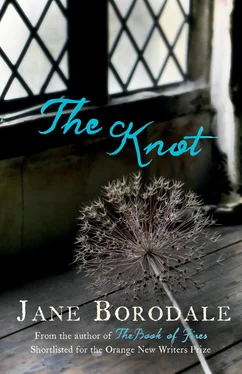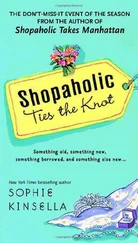‘Henry?’ He can hear her shrieking for him. ‘Henry! Is this beef we are having today?’
‘I hardly know, madam, I—’ Henry stands awkwardly at the kitchen doorway, trying to avoid the glower of Old Hannah, standing by the fire with her basting spoon in hand. ‘It is not my business to poke about in there.’
‘It won’t be done on time, you know we’re hungry after the ride. Look at that fire.’
‘You are very early. Perhaps—’
‘Where’s that wife of yours?’
‘She is … upstairs, madam, and will be with us shortly.’ Henry knows that Frances will be in her chamber, staving off that minute when she must glide down the staircase like the lady of the house she is, and greet her mother-in-law with gracious if entirely feigned obeisance.
He goes to the foot of the stairs and looks up but does not call. He is not sure but thinks he hears a door being slammed at the end of the corridor. He hopes there might be a kind of unspoken solidarity between them both now that Joan Young is in the house – perhaps the only feeling that they share, but some men would have less to boast of. He takes a deep breath and goes back to the hall, to seat his father according to the rules of honour. He feels stifled with anxiety, his throat so tight he can hardly get simple niceties and phrases out. His girls appear one by one and curtsey properly before they take their places, which is a relief, and even though the guests have arrived so appallingly early Old Hannah manages almost immediately to produce a first course of roast fowls and salad, but after this it is unfortunate that the beef takes a long time to appear, and so does Frances.
‘Where is that wife? Does she exist? Of course she does, I can smell there’s a woman about the house,’ Joan says, pushing her plate about impatiently.
‘I do dislike a hiatus in a meal,’ she hisses to Edith, sitting next to her at table. ‘A gap can feel so dissatisfactory. It is fortunate that nobody important dines with us today.’ She casts her eye glassily round the hall, though as Henry Lyte knows she is short of sight, she will not have focussed much on anyone.
After all that fuss, she doesn’t eat much, helping herself to meat but draining the juice away with the edge of her spoon against the bowl as though the dish is too watery, turning the loaf suspiciously to check the underside for mould, rifling through a salad of winter cresses to find the choicest pieces of bottled artichoke, only to fling them back with a bitter little sigh and eat nothing. Though she does like bones, sucking the last little fibres of meat from them, snapping them to get at any traces of marrow concealed inside.
When Henry enquires after the journey, she runs through a tedious itinerary of the way they had taken, and how poor the roads in this part of the country, how hopeless the route chosen and how slow the horse.
His father, who until this point has not uttered a word, puts his knife down.
‘That carriage was a mistake,’ he mutters.
‘No John,’ she snaps, in front of everyone. ‘It was that the horse was inadequate.’
Nobody else seems to blanch at the way she speaks to her husband before company. For a second he catches Jane’s eye, and then when he looks at his father he sees a small red patch, the size of a coin, flare up on his left cheekbone. Even when the conversation veers towards the matters of local taxation that usually rouse his father to table-thumping vehemence, he toys with his table knife in silence. Either he is feeling unwell or he, too, has something heavy weighing on his conscience or his family affairs. Henry looks across at his own offspring and tries to imagine their roles in reverse. He is a very different kind of father, isn’t he? But after all, children rarely consider the innermost feelings of parents, indeed they do not seem to have them, which is the natural order of things.
The girls are very quiet during this visit. Jane in particular says not a word, she sits still through the meal; bowing her head as they say grace, eating neatly what is put on her plate, dabbling her fingers clean in the waterbowl. She is occupied in watching, taking in whatever strangeness it is happening just under the surface in all of them, her eyes flicking between the adult faces as they speak. Henry wonders how she can be aware that something is wrong. On the surface this is a perfectly ordinary family day. After all, nobody else could possibly know that there was such a storm swilling inside him. Why should they? Any guilt or resentment is entirely his own, entirely invisible.
Joan Young. Even her name is a contradiction, she is the furthest from young a body could ever be, representing for him all that is shrivelled, bitter, hardened. There is a shallow stream he knows up on the Mendip which, if one drops a stick or small object in its flow, with alarming rapidity will grow a crust of greyish lime about it, as hard and coarse as any stone. He imagines that someone caught habitually in her presence could suffer a similar fate, because stoniness exudes from her very soul, like a contagion. He can see it slowly afflicting his father, a callous skin edging across his being. Looking at his father is like looking at himself as he would appear in twenty years if he had a crust of stone grown over him.
Frances is the last to join them at the table, in fact she is distinctly late by the time she glides into her seat. Henry is not sure if she has done this on purpose, even though she is very pale. He hopes she doesn’t have the green sickness, from which his sister used to suffer.
‘Ah!’ his father says, rising briefly as she takes her chair beside Henry.
‘I’ve always been a good riser,’ Joan Young remarks.
‘Even when expecting, madam?’ Frances smiles sweetly at the nearest child and takes some bread from the basket, and then the long-awaited beef course arrives and there is much chatter and diversion.
Henry looks at her astounded.
No-one else seems to have heard what she said. What is the matter with everyone, are they deaf? And though he keeps on staring at her through the rest of the meal she does not speak again after that, and the conversation veers towards his father’s lawyer who is unwell. When they have finished eating Henry follows her down the corridor into the kitchen and closes the door.
‘Madam, did you mean to—’
‘Shhh.’ She puts her finger up to her lips and smiles, her eyes dancing.
‘That’s all you can say? You can’t leave a man unsure over something like that! I beg you!’
She touches his arm. ‘We’ll see. I am rarely so late with my courses, and I have begun to feel sick these last few days. But it may be nothing.’ She will say no more.
Henry’s heart is racing inside his chest with familiar apprehension and hope. ‘A child!’ he whispers to Blackie, who thumps the stub of her tail once on the flagstones. This time it will surely be different. His new wife’s first baby.
Henry pays slightly less attention to the rest of the day than he should. Ignoring his father’s reticence, he goes with him anyway to examine his windmill up in Cowleaze field though the tenant is out, then they skirt across to Inmead. Though they stand and look out at the view to the wet moorfields, they do not speak, and as his father does not ask about the trees he does not tour the orchards with him as Henry had planned. Indeed they do not do anything he planned; he feels rather superfluous, as though he were following his father about in the same, slavish manner as Blackie, trotting at his heels. His mind is elsewhere now, though, and he is almost grateful when the horses are got ready early and his father and stepmother leave despite the special supper being prepared.
The very house itself seems to let out a sigh of relief to see Joan Young gone, as the carriage containing her pulls mercifully out of the yard and onto the track towards the road, trundling back off to Sherborne again where she belongs. His father had not mentioned, Henry realizes, any sale of cows.
Читать дальше












